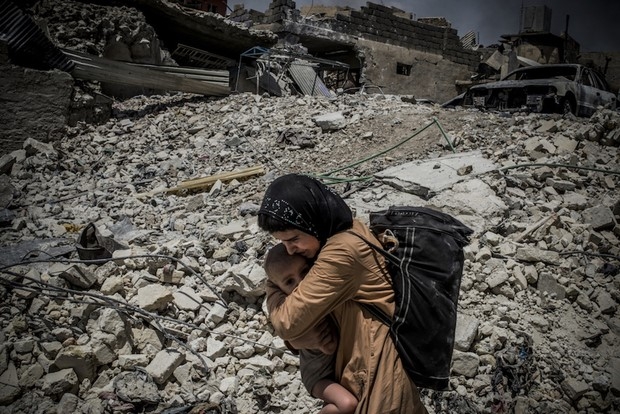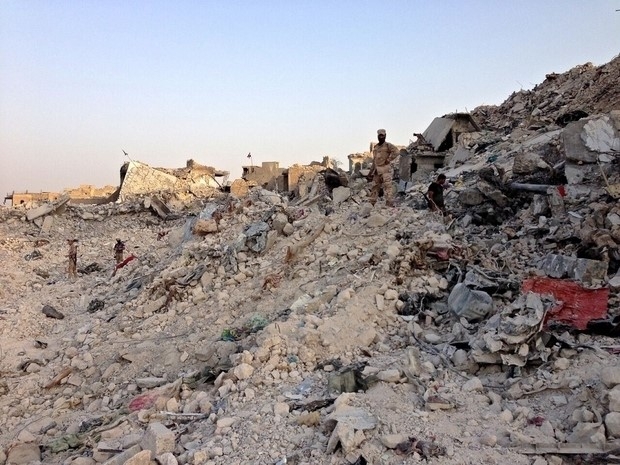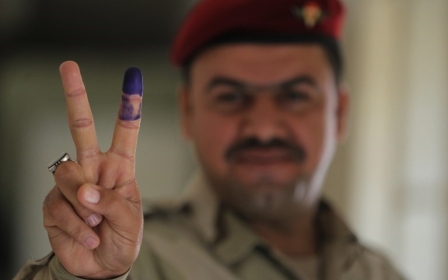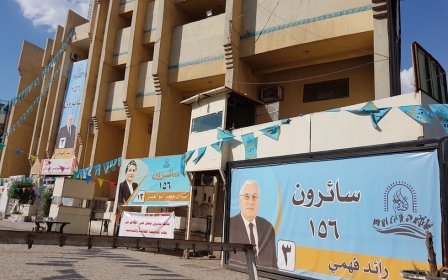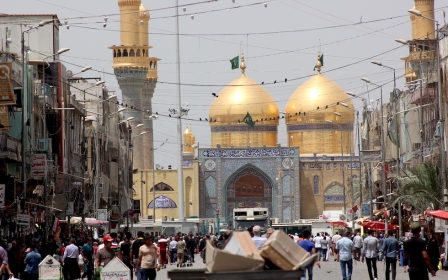Meet the Mosul youth working to change the Iraqi establishment
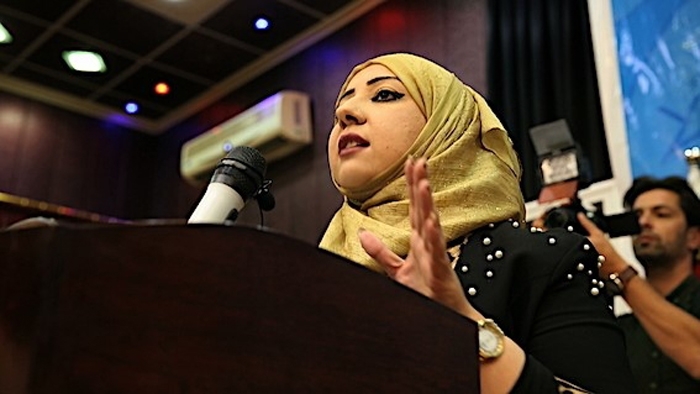
MOSUL, Iraq - Naram Muhamad organises meetings with her civic group at the Book Cafe, a new spot which opened in December near Mosul University.
Here painters and musicians discuss politics and culture, and university lectures are held, including, most recently one organised by the political science department on ways to get become politically involved.
I don't want to see those usual faces in power anymore. I will vote to make things happen
- Naram, 24, activist in Mosul
It's a far cry from life under the Islamic State (IS) group, which declared its caliphate four years ago from the city and was defeated only last summer - and a moment young people like Muhamad are seizing.
Muhamad, 24, studied computer science and became politically active by chance when she was still a teenager.
"I used to act anonymously. Me and two friends used to meet in secret. We were introduced at an event organised by the Ministry of Education in 2013," she told Middle East Eye.
During this period, she wrote to contacts at Amnesty International and Human Rights Watch about human rights violations and abuses by Iraqi security forces - until IS took over.
"To save my own skin, I stopped writing under Daesh," she said, using the Arabic term for IS. Of the three activist friends, only Muhamad survived. One disappeared and the other was sentenced to death under IS.
Now that IS is gone, she has fully resumed her political activities.
"For now, I'm still a civic activist. Since the liberation, I have created a discussion group with about 20 people. We do political observation," Muhamad said.
For the moment, she doesn't plan to launch her own political movement, but instead pushes for young people to become active. "I don't want to see those usual faces in power anymore. I will vote to make things happen", she said.
Fighting 'a plague'
Isra al-Sultan 34, is committed to getting fellow Iraqis to the polls, especially now in the lead up to this week's countrywide parliamentary elections.
Since January, she has been organising plays in parks across Mosul to raise awareness about the damaging effects of abstention, which she calls a "plague".
"I try to stay as close to my fellow citizens, and I visit refugee camps to help them vote despite their limited access to polling stations," Sultan said.
One of Sultan's political role models is German Chancellor Angela Merkel, but her political engagement has been shaped by the tribulations of her own country, city and life.
She campaigned informally under al-Qaeda, fled the invasion of IS following threats and eventually crossed the desert to Baghdad with her sister.
In the capital, life was "freer, more open". Last year, she formed a civic, multi-ethnic and non-religious movement which became the Reformed People's Party - with branches in several major cities.
"We focus on the individual without religious or ethnic distinctions. We want to put forward the notion of citizenship," she said.
Sultan is mainly committed to the defence of human rights and more particularly women's rights.
Since the 1970s, Iraq's feminist movements have been in constant decline, especially during the de-Baathification process the followed the fall of the Iraqi regime in 2003. The 2005 Constitution abolished laws guaranteeing women's rights.
For years, women have had minimal representation in the Iraqi government, but that is slowly changing as new female candidates emerge in the city.
Since 2005, women have been assigned a quota to occupy 25 percent of the 275 parliamentary seats, but Sultan said that change hasn't spurred women to engage in elections as much as she would like.
"I often meet women to explain to them that it's important to vote without being influenced by their husbands. I'm fighting against this situation, but I know it's not going to change radically," she said.
She also campaigns for the integration of young people in society and politics, the redefinition of citizenship and post-IS reconstruction.
"I help to find Daesh's disappeared," Isra said. "Being elected will be a culmination of my goals, but for now I am focusing on rebuilding the city, which will take a long time.
"I've been through hell, I'm no longer afraid. I hope one day to see a leadership which every woman can identify with."
She added: "I want to break the societal paradigms that degrade women, and end the inferior status of women in the Iraqi political landscape. Moreover, my programme is mainly about women's rights, [about] giving them a role. It is still difficult to be a female activist in this society, but I want to achieve my goal."
'The hope of living'
Rana Khalil, 33, is running for parliament on Iraqi Prime Minister Haidar al-Abadi's Nasr Coalition List.
Her medical background helped her with her humanitarian work in different camps like Hamam al-Alil, but then she was forced to flee Erbil during the campaign against IS.
While studying, Rana was an activist who led seminars about violence against women and encouraged young people to get involved in politics. "[We did that] outside the university because inside, politics is forbidden," she said.
Fahad Ayousif, 31, is also running on a Nasr list. He recently became head of the local office for the Ataa Movement - a party established by the leader of the Popular Mobilisation Forces - which he joined four months ago.
A Mosul University political science graduate, Ayousif said he chose to run in a list that was already well-known. "Politics in this region can be summed up in a triptych: authority, finance and image. It's difficult for young people to meet all three conditions," he said.
"So first we created a youth movement with a friend, Athik, which is unlike the old parties. What we have is media visibility," Fahad said.
Several youth movements met in December at political forum for younger Iraqis. They decided to vote for five future representatives, including Ayousif, running independently or on a party ticket so that they could meet voter demands in the upcoming elections.
Initially, they were a small group of volunteers that called itself the "Mosul Youth Cell".
"Before liberation and during the battle, we helped the army. Our act of resistance was first and foremost aid, such as bringing food during the battles," he said. "Then we had a network of young people inside Mosul who informed the army of Daesh's movements."
One of their main activities was what Ayousif describes as "the hope of living" - organising music festivals or photo exhibitions that bring young people from all over Iraq to the University of Mosul.
"We have also built bridges between Sunnis and Shias by organising trips for young Mosulites to southern Iraq. All ethnic groups such as Yezidis, Kurds and Christians are represented," he said.
Perseverance amidst the destruction
One of Fahad's references is Ali Ajwan, a 31-year-old PhD graduate in international relations, who taught at Bayan University in Erbil (Iraqi Kurdistan) after fleeing his hometown.
These days he is mostly focused on Mosul, but he aspires to get into government and, unlike Ayousif, wants to remain independent and unaffiliated with any party.
Ajwan decided to get into politics at a time when Naoufel Hammadi al-Soultane, the current governor of Nineveh was facing accusations of corruption.
Ajwan also fights against what he calls the control and hegemony of certain parties and the influence of "regional powers such as Iran or Turkey which control [some] Iraqi parties".
Ajwan is focused on issues of reconstruction, economic recovery measures and new methods of managing the city.
"The town is half destroyed, especially the Old City where the fights were [particularly] violent. We need rapid reconstruction, and the government has been unable to do that," he said.
"In my programme, I propose working with foreign companies that would employ Mosul's citizens. Physical reconstruction is needed for human, intellectual and academic reconstruction to follow."
Ajwan has managed to attract the interest of "competent youth," who he said could become members of the 23-seat governorate council. "The Iraqi political landscape must change through its youth. I have been criticised for starting from nothing and having too much ambition," he said.
"But for the young people, I created an awakening, and I already have with me about 10 talented people. The foundation for a real political future in Iraq is competence, which many of our corrupt representatives do not have," he said.
"In one incident, I made a presentation amid the ruins. It reminded me of an old picture of a teacher who continued to give classes despite the destruction, in 1944 Japan."
New MEE newsletter: Jerusalem Dispatch
Sign up to get the latest insights and analysis on Israel-Palestine, alongside Turkey Unpacked and other MEE newsletters
Middle East Eye delivers independent and unrivalled coverage and analysis of the Middle East, North Africa and beyond. To learn more about republishing this content and the associated fees, please fill out this form. More about MEE can be found here.


